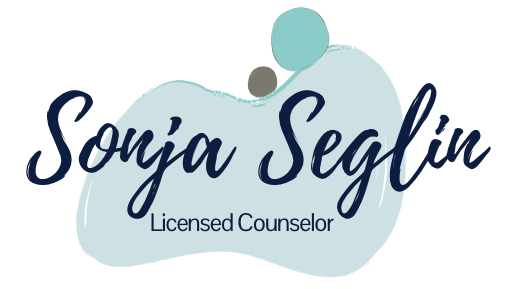Anxiety Therapy
What is anxiety?
Oh, anxiety. When your brain gets caught in a loop and you feel totally trapped. My own experience with it takes the form of thinking and thinking and thinking…can you relate? Or, maybe your own anxiety looks more physical. Here are some indicators of anxiety:
You find yourself constantly looking for some concrete, certain Truth, some ultimate solution to all the problems
You have satisfying ‘aha’ moments, but the impact never seems to last.
You get so wrapped up in making sure you’re doing it right that you have incredible difficulty actually taking action.
You relate very much to the feeling of languishing: a sense of stagnation and emptiness.
You frequently hear yourself complain about feeling stressed out, tired, and unfulfilled
Your mental chatter pulls you away from the real world, and you freeze when it’s time to ‘buckle down’ and do what’s in front of you
Your IG feed includes some incredible advice that you can never seem to integrate in your own life
You have a paralyzing fear of making the wrong decision, and therefore don’t make any decision at all.
If any of this feels true for you, you might be feeling stuck in negativity and feeling exhausted and unsatisfied, and like life is being wasted on being unhappy.
Therapy for anxiety is here to help!
You Are Not Alone.
In the fast-paced and demanding world we live in, it's no wonder that anxiety has become such a common issue.
Juggling the pressures of family, career, and social obligations can take a toll on even the strongest of individuals. It leaves many people feeling overwhelmed, restless, and uncertain about their own capabilities. From sleepless nights to racing thoughts, anxiety can be incredibly challenging, affecting both mental and physical well-being.
Anxiety is a normal response to the complex demands you face every day. From managing household responsibilities to ensuring your children's success, the weight of responsibility can become unbearable at times.
You might have internalized American society’s message that you’re supposed to be able to get rid of all by yourself. You might even believe that anxiety is a sign of weakness, and feel some shame that you’re experiencing it.
You are not weak, and no one is meant to heal emotional wounds alone. Strength is finding the courage to ask for help within our individualistic culture.
No one actually lifts themselves up by their bootstraps. It is a community effort to care for each other so that we learn how to care for ourselves. When you enlist support in feeling better, it will create ripple effects that will be felt in your family, at your job, and throughout your relationships.
Anxiety is a reminder that you care deeply about your family and your own personal growth. By acknowledging and normalizing anxiety, we can create an environment where you feel supported and empowered.
By prioritizing self-care and implementing healthy strategies, you can reclaim your inner peace and regain a sense of control. Whether it's practicing mindfulness exercises, engaging in regular exercise routines, or carving out time for personal hobbies and interests, small but intentional steps can make a significant difference.
You are not alone in your struggles.
Remember, anxiety is a shared experience. By normalizing it and then addressing it directly, we can foster a community that supports the mental health and well-being for everyone.

Find Your Calm Amid Chaos
Imagine a life where you could…
Confidently define who you are and what direction you’ll go next.
Create a more meaningful life based on who you are and what you desire.
Get to the root problems and solve those instead of using band-aids.
Change your life for the better.
Go ahead, dare to dream. Imagine waking up and feeling lighthearted, ready to have fun new experiences without being bogged down by worry.
You are fully alive.
Each small decision no longer takes on existential importance; you can simply move through your day, choosing to do activities that serve you. You can experience challenge without overwhelm.
You know how to care for yourself. Come into therapy to remember and act on what you already know.
Befriend Your Wild Mind
Therapy for Anxiety helps you rise above your challenges and start moving towards your ideal life. You’ll experience less suffering and more fulfillment. You will make peace with your wild mind so that it stops getting in your way. You’ll start putting one foot in front of the other, and learn confidence in yourself as you do so.
You will get tools to feel grounded and directed, and to lower your overall anxiety in life. You will grow into who you really are.
I've helped people who are constantly in their heads find their way to connecting more to the world around them, leading them to more satisfaction and contentment in life. Through balancing the desire for more, more, more, with the skill of gratitude for the current moment, my clients learn to live to their full potential. They can fully and confidently claim the life they desire. This can be yours, too.
Using the tools of therapy, you can shift your perspective so that your life doesn’t feel so very burdensome. And maybe you can start enjoying it more.
Even if you are not sure how a therapist could help you, Therapy for Anxiety may be the right fit. My name is Sonja Seglin and I am a therapist who is here to help. Starting your search for support was your first step towards finding more calm in your life. The next step is to reach out so we can decide if my services are right for you.
The Treatment Options
When you come to me for therapy, you’ll have access to a number of different ways to ease your anxious mind:
Ketamine Assisted Psychotherapy is one option to help you get past anxiety barriers. By using this medicine, you become more able to integrate new thought and behavior patterns into your life. Since this is a cutting edge approach, it’s expected that you would have lots of questions about it. Click here for more detail, and of course we can discuss further whether this would be a good fit for you.
If you’re interested in a more structured journey, I offer a 10-12 week program based on proven techniques that focus on reducing anxiety. Throughout those weeks, we will clarify your values. Then, we identify how your current lifestyle might not be in line with those values, causing emotional distress. From there, it becomes much easier to create a plan to make tiny changes to bring your life in line with your values, and to move through barriers when they arise.
Some people prefer a more open ended exploration of their minds. This organic approach has robust research supporting its effectiveness. Working this way allows us to incorporate activities such as art, guided meditations, ‘venting,’ exploration of your childhood, analysis of your relationship patterns, focusing on problem solving in your daily life, or anything else.
Nature therapy, where we engage with the natural world around you in order to teach your mind new ways to feel. Click here for more information about how nature therapy works to help relieve the symptoms of anxiety.
Any or all of the above
No matter how you choose to move forward, there are some things that I always strive to bring into the therapy space.
I provide a safe, accepting space so that you will feel comfortable sharing your struggles with me.
I welcome any spiritual practice into the room. If you consider yourself a spiritual person, you can feel assured that your beliefs will be respected, and may even prove an integral part of our work together.
We will partner on defining your needs from therapy.
We will check in periodically to make sure you are getting what you need from the therapy process. Since this is different for everyone, it’s important that we can talk openly about how you’re feeling about the work.
Over the course of our sessions, you will start making progress towards the life you desire.
In session, you will notice that I tend to be active and engaged, and even funny sometimes (or not, you can make your own opinion about that). Clients have told me that they find me to be warm and that they appreciate my willingness to push back and challenge them, even as I am able to empathize with their struggles.
Frequently Asked Questions
-
It’s natural to have some concerns about entering into therapy as a way to deal with your anxiety. Many clients are skeptical at first, and then find that the work they do in therapy changes their lives in ways they could never have predicted.
-
Maybe you’ve tried therapy in the past, and didn’t see results (or haven’t yet). I’ve had this experience in my own journey as a client in therapy, so I get it. The research consistently shows that the right fit between client and therapist is key to effective therapy. For that reason, I offer a free initial consultation, and I check in regularly so that we can be sure we are heading in a useful direction. Your feedback is always encouraged and taken seriously.
The strategies I use to treat therapy are shown to be helpful for many different people. No matter how we approach the problem, the experience we aim for is to identify thoughts and feelings that you find intolerable, and the behaviors you currently use to manage those thoughts and feelings. We will practice ways to shift responses when necessary. We will talk about what’s happening inside of your brain and body that is creating your moods and mindset, and with that knowledge, you’ll be empowered to make change where you feel it would be helpful. You may have heard of some of the techniques often used, such as Cognitive Behavioral Therapy (CBT) and Eye Movement Desensitization and Reprocessing (EMDR). These are among a number of approaches that have strong scientific support for their effectiveness, and I lean heavily on them to guide our work together.
-
Therapy is an investment in your future well-being. The returns on this investment are immeasurable. By taking an hour a week to focus on your own inner workings, you’ll not only feel better yourself, but you’ll also be in a much stronger position to help those around you. Your body will feel it. Your family will feel it. Your co-workers will feel it. You are planting seeds that you get to watch develop for years to come.
You may also find that your insurance will cover all or part of the cost of therapy. Click here for more information on thatDescription text goes here
-
No! It doesn’t have to! It’s true that some people find the process of therapy so helpful in maintaining their mental stability that they decide to continue sessions without setting an end point.
That’s not everyone’s experience.
I offer time limited approaches to anxiety management that focus more on learning and integrating new habits.
Additionally, I fully support the practice of taking a break from therapy, and in fact find it quite valuable to do so.
You are not stuck.
The duration of your therapy is up to you.
-
It's normal to feel hesitant or uncomfortable about opening up at first.
That’s why I work so hard to create a space in which you feel safe. I am already on your side, and invested in your well-being. And, whenever you don’t want to talk about something, we won’t. Trust takes time to build, and that’s ok.
-
Yes! You can, and you should. But they aren’t your therapist (or at least they shouldn’t be). Unlike informal relationships, your therapy hour is unquestionably dedicated just to you and your well-being. My expertise is in guiding my clients to discover and create new parts of themselves. Rather than staying in homeostasis within established, informal relationships, our work together has the overarching goal of creating change, even when it’s not comfortable.
Your friends and family are an integral part of your mental and emotional well-being. It may be a therapy goal to help you strengthen those relationships, or let go of guilt about letting yourself be cared for by your network.
Just as it’s helpful to hire a personal trainer for your workout, or a nutritionist for your diet, it’s also helpful to have professional input on your mental health journey.
Let’s get started today.
Ready to start feeling better? If you are tired of feeling out of control and locked in your thoughts, Therapy for Overthinkers could help.
Start now and begin building your confidence. During your free 10 minute phone consultation you can start getting a feel for how I can help and we can discuss next steps.
Email me to schedule your free phone consultation today at sonja@sonjaseglin.com.




